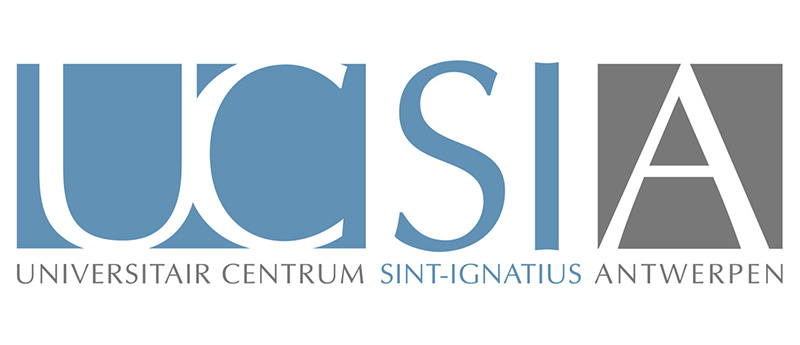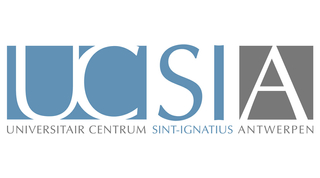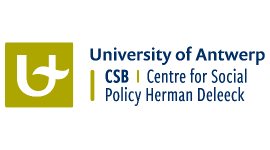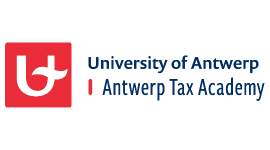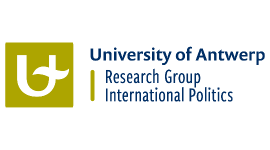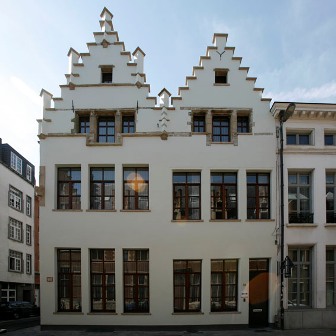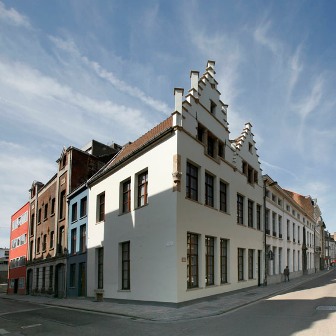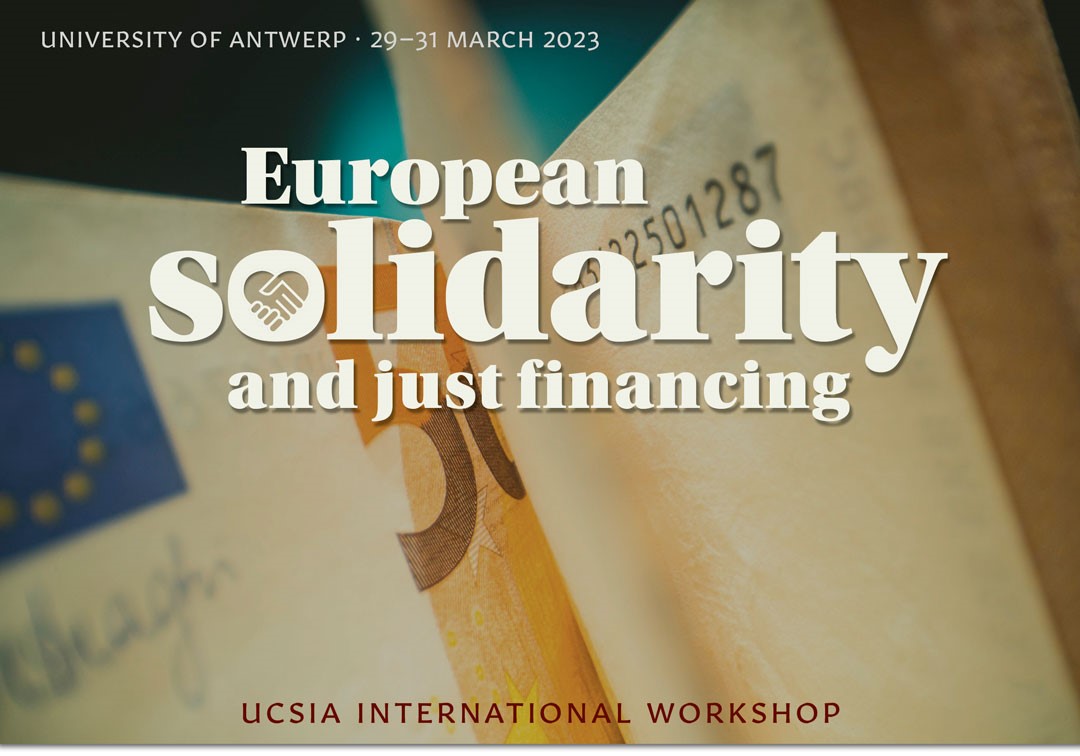
Academic workshop on
European Solidarity & Just Financing
29-31 March 2023
University of Antwerp, Belgium
Call for Papers
Application deadline: 24 October 2022
Notice of acceptance: 30 November 2022
Full details below
On March 29th – 31st 2023, UCSIA organizes an academic workshop on European solidarity and just financing at the University of Antwerp.
The 2008 financial and economic crisis as well as the current war in Ukraine and the persistent COVID-pandemic fundamentally challenge the European Union (EU) and its member states. These crises go to the core of the question which place solidarity has and ought to have within the EU. Over the years different support mechanisms have been developed, while in the meantime an inconceivable hurdle has been taken: on the motion of Berlin and Paris, the European Commission launched a temporary recovery instrument that would be financed through common debt issuance and that does not impose supplementary conditions on the member states. At the same time, the latter will once have to repay all these funds. And even more important, the common debt issuance only offers a temporary instrument and cannot be seen at all as a precedent. Exceptional circumstances call for exceptional measures.
The support mechanisms (e.g. ESM, SURE and NextGenerationEU obligations) which have been installed over the years, also require new and adapted financing instruments. The European Commission has acquired new fiscal competences which make it possible, among other things, to charge carbon emissions at its borders as well as digital services. Next to that, other funding possibilities include emissions trading, taxes on financial transactions and a new common corporate tax base.
The introduction and further development of new and existing support mechanisms along with new financing instruments entail further steps in the creation of a ‘Social Europe’. It makes the question ever more pressing which place the EU actually holds in the domain of social policy.
- What role does the EU need to take on as an actor in income redistribution and insurance?
- What is the relation of the EU towards its member states, citizens and towards other larger international organizations, such as the OECD?
- What, if anything, can justify the development of temporary and/or structural support mechanisms?
- How should these support mechanisms best be organized? What advantages do they create and what risks do they entail?
- How can the financing instruments be rolled out in a just way? Are there particular winners and/or losers?
- Can this be justified or remedied?
The quest for solidarity, whether or not on a European level and in whatever form, could be labelled as a ‘wicked problem’. The challenges with which the EU has been confronted during the last 15 years in its search for an appropriate role in the field of social policy (if any), are not new at all. Over the centuries questions about solidarity and responsibility have been dealt with in various ways. And although we have come a long way, the core of the problem remains, as could be seen clearly in the pioneering discussions of the early modern period. At the time various intellectuals explored new and innovative methods to deal with liquidity problems and investment instruments – just as we do today. However, the early modern discussions were strictly related to a micro level that affected relations between individuals. A crucial step was the development of (nation) states which acted as reliable financial institutions and lenders themselves. The state itself became an actor as a result and part of the social contract tradition of the 17th and 18th centuries. It laid the basis for the present situation in which we are no longer just thinking in terms of relations of solidarity and responsibility between individuals, but between states and between a supranational level and its individual citizens. The current developments in Europe and the world make these questions about solidarity and responsibility ever more pressing. Can we arrive at a new social contract between states as we did in the past with a social contract between individuals? Or can we come to a new social contract writ large?
Keynote Speakers
Bert Brys
Senior Tax Economist | Head of the Country Tax Policy Team and Head of the Personal and Property Taxes Unit in the Tax Policy and Tax Statistics Division of the OECD’s Centre for Tax Policy and Administration
He joined the OECD in 2005. Within the OECD he has worked on a broad range of taxes, tax indicators and tax policy design topics, including personal income taxes and effective tax rates on labour income, property taxes, corporate income taxes, political economy issues of tax reform, taxation and economic growth and taxation and skills indicators and issues. Prior to joining the OECD, he worked on tax issues for the Flemish Regional Government in Belgium. He holds a PhD degree from the Tinbergen Institute, Erasmus University Rotterdam, the Netherlands. He also obtained Master degrees in economics from the Universidad Autonoma de Barcelona (Spain), from CenTEr at Tilburg University (the Netherlands) and from Universiteit Antwerpen (Belgium).
Philipp Genschel
Professor of European Public Policy at the Robert Schuman Centre for Advanced Studies and the Department of Political and Social Sciences of the European University Institute, Florence | Professor of Political Science at Jacobs University
Waltraud Schelkle
Professor in Political Economy at the European Institute of the London School of Economics | Adjunct Professor of economics at the Economics Department of the Free University of Berlin
Isabel Vansteenkiste
Director General for International and European Relations at the European Central Bank (ECB)
Isabel Vansteenkiste has worked at the ECB since 2002. Previously she held the position of Deputy Director General in the Directorate Monetary Policy and in the Directorate General Economics. In the latter Directorate General she was also senior advisor for the preparation of Governing Council meetings and Head of the Country Surveillance Division, which assesses euro area countries’ economic policies. As Deputy Director General Economics, she participated in European meetings (of the Eurogroup Working Group, the Economic and Finance Committee and the Eurogroup), and as Head of the International Policy Analysis Division, she participated in international meetings (of the BIS, G7 and G20). She was also the ECB’s mission chief to Portugal from 2014 to 2017. Isabel’s main fields of research interests are international macroeconomics, applied macroeconomics and monetary economics. Isabel holds a PhD degree in Economics from the Katholieke Universiteit Leuven.
Programme Outline
Public Opening Lecture
Wednesday 29 March 2023
More information will be posted soon.
Thursday 30 March 2023
9h00
Welcome by UCSIA
9h05
Introduction by chair
9h15
Lecture on
Political Analysis
Philipp Genschel
Professor of Political Science
Robert Schuman Centre for Advanced Studies
9h45
Response
respondent to be confirmed
10h00
Q & A
10h45
Coffee Break
Paper Presentations Panel I
Lunch
13h30
Introduction by chair
13h40
Lecture on
Three Pillars Approach of the OECD
Bert Brys
Senior Tax Economist
Centre for Policy and Tax Administration, OECD
14h10
Response
respondent to be confirmed
14h20
Q & A
15h10
Coffee Break
15h30
Paper Presentations Panel II
17h00
End of Day Programme
Friday 31 March 2023
9h00
Welcome by UCSIA
9h05
Introduction by chair
9h15
Lecture on
Policy Analysis
Waltraud Schelkle
Professor in Political Economy
European Institute, London School of Economics
9h45
Response
respondent to be confirmed
10h00
Q & A
10h45
Coffee Break
11h00
Paper Presentations Panel III
Lunch
13h30
Introduction by chair
13h40
Lecture on
Financial Analysis
Isabel Vansteenkiste
Director General for International and European Relations
European Central Bank
14h10
Response
respondent to be confirmed
14h20
Q & A
15h10
Coffee Break
15h30
Paper Presentations Panel IV
17h00
End of Day Programme
Call for Papers
The workshop ‘European Solidarity and Just Financing’ consists of a two-day international meeting (preceded by a public opening lecture) with specialized lectures, presentations and debates by invited senior and junior scholars. The aim is to offer a platform to scholars to present their research on the topic and exchange their ideas on research findings. Such a meeting may open up new multidisciplinary horizons to think about the topic.
We welcome both theoretical contributions and empirical papers.
Papers presented at the workshop will focus on, but will not be limited to, such questions as:
- What role does the EU need to take on as an actor in income redistribution and insurance?
- What is the relation of the EU towards its member states, citizens and towards other larger international organizations, such as the OECD?
- What, if anything, can justify the development of temporary and/or structural support mechanisms?
- How should these support mechanisms best be organized?
- What advantages do they create and what risks do they entail? How can the financing instruments be rolled out in a just way?
Application Procedure
To submit your application
- fill in the online submission form
- upload the abstract (750 – 1.000 words including references, in English) of your proposed paper
- upload your curriculum vitae, in English, list of publications included (if available)
Application deadline: 24 October 2022
Day(s)
:
Hour(s)
:
Minute(s)
:
Second(s)
Selection Criteria
Applicants should
- be a master student, doctoral student or postdoctoral researcher
- be involved in ongoing academic research relevant to the themes addressed in the sessions of the workshop
- respect formal requirements of the application process
- submit a well written paper proposal, related to the main topic of the workshop and representative of your research work, indicating the methodology and theoretical underpinning of your research
Selection Procedure
Blind peer-review:
The selection of participants will be made on a competitive basis by the members of the organizing scientific committee. The papers will be examined through a blind refereeing process. Incomplete applications will not be considered.
Notice of acceptance:
30 November 2022 at the latest
Workshop Attendance
- conference attendance, meals and accommodation for the selected presenters are free of charge
- all participants are expected to arrange and pay for their own travel
- all participants are expected to take part in the full programme
Presentation and publication opportunity
- selected participants will present their papers in a panel session
(20 minutes in English) - a selection of papers presented at the workshop will be considered for publication
Organisers
Bea Cantillon, Professor of Social Policy, Centre for Social Policy Herman Deleeck, University of Antwerp
Dirk De Bièvre, Professor of International Politics and Chair of the Department of Political Science, University of Antwerp
Sarah Marchal, Tenure Track Professor Socio-Economic Inequality and Policy, Centre for Social Policy Herman Deleeck, University of Antwerp
Bruno Peeters, Professor at the Faculty of Law and Director of the Antwerp Tax Academy, University of Antwerp
Erik De Bom, Deputy Director, University Centre Saint-Ignatius Antwerp UCSIA
Barbara Segaert, Project Coordinator Europe & Solidarity, University Centre Saint-Ignatius Antwerp UCSIA
Contact
Barbara Segaert, Project Coordinator, UCSIA
barbara.segaert@ucsia.be
UCSIA vzw
University Centre Saint-Ignatius Antwerp
Herman Deleeck Centre for Social Policy
studies social inequality and wealth distribution in the welfare state
Antwerp Tax Academy
interfaculty institute for tax science at the University of Antwerp
Research group International Politics (IP)
researches on international security, international diplomacy, and the political economy of international institutions
Practical details
Date & Time
Academic workshop: 30-31 March 2023
Public opening lecture: 29 March 2023
Call for Papers
Application deadline: 24 October 2022
Notice of Acceptance: 30 November 2022
Full details | Online submission form
Venue
University of Antwerp
City Campus – Hof van Liere
Prinsstraat 13 & 13 B, 2000 Antwerp
BELGIUM
Travelling to Antwerp from Abroad
International trains
Antwerp Central Station offers direct railway connections to Amsterdam Centraal, London St Pancreas International, Paris Nord and Köln Hauptbahnhof.
This makes the train a comfortable and green way to travel to Antwerp from many larger cities in the Netherlands, Great-Britain, France and Germany.
We recommend you to order your train tickets as soon as possible, because prices increase in time. The earlier you book, the cheaper your trip. Ticket sales open three to six months in advance, depending on the trainline operator.
When you arrive in Antwerp Central Station, take a minute to look around you. Many travel guides have rated it as one of the most beautiful stations in the world.
Brussels National Airport
Brussels National Airport in Zaventem is the most travelled airport in Belgium. If you are coming by plane, you will most likely arrive here.
The Airport Express is a direct coach service that runs every hour (3 a.m.-12 p.m.) between Brussels Airport and Antwerp Central Station. The ride takes about 45 minutes. You can find the bus stop at park P15, close to the terminal. The covered walkway leads you automatically to and from the terminal.
There is also a direct train connection (twice an hour) between Brussels Airport and Antwerp Central Station. The approximate travel time is 32 minutes. The airport train station is located below the terminal (basement level -1). Keep your train ticket at hand upon arrival at Brussels Airport. You will need to scan it at the automated access gates.
More information:
www.brusselsairport.be/
Antwerp City Airport
Antwerp Airport is a small airport located in Deurne at a mere seven kilometers from the city centre of Antwerp. It covers a selection of mostly European destinations such as London Southend, Florence, Innsbruck, Malaga, Split, Toulon, …
The easiest way to travel to the city centre is by taxi (15 min, € 15).
You can also take public transport, but there is no direct service. Take bus 51, 52 or 53 directly in front of the airport building to Antwerp-Berchem railway station in 10 minutes, where you can take bus 21 and 32 or tram 9 and 11 to Rooseveltplaats (Roosevelt Square), near Antwerp Central Station.
More information:
www.antwerpairport.aero
Amsterdam Airport Schiphol
Another option is the international airport in our neighbour’s capital: Amsterdam, the Netherlands. Especially for long distance flights, it is an alternative worth looking into. Your journey could turn out significantly cheaper and/or shorter.
There is a direct train connection between Schiphol Airport and Antwerp Central Station every hour. The estimated travel time is under an hour.
We recommend you to order your train tickets as soon as possible, because prices increase in time. The earlier you book, the cheaper your trip. Ticket sales open four months in advance.
You can also buy international train tickets at the NS Hispeed desks, located near the Meeting Point at Schiphol Plaza.
The NS train station is located directly below the terminal building. Take the escalator or lift downstairs and board the train.
More information:
www.brusselsairport.be/en/
Brussels South Charleroi Airport
This is an airport with mostly short distance destinations (with the exception of Hong Kong). The majority of the flights are operated by low cost airlines.
Mind: although your flight might be cheaper, travel time to and from Antwerp will be longer and your transport options for early and late flights are limited.
Also take into account that, although the airport is called Brussels South, it is located in Charleroi, which is in no way near to Brussels National Airport. When booking your train tickets make sure to select the right railway station.
You can buy a single or return ticket (same day return) to “any Belgian station” from the ticket machines outside the terminal near Door 2. This ticket includes the TEC bus journey (from the airport to Charleroi-South station) and the train journey (from Charleroi-South station to another Belgian station of your choice).
More information:
www.brussels-charleroi-airport.com
